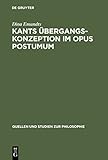Kants Übergangskonzeption im Opus postumum : Zur Rolle des Nachlaßwerkes für die Grundlegung der empirischen Physik / Dina Emundts.
Material type: TextSeries: Quellen und Studien zur Philosophie ; 62Publisher: Berlin ; Boston : De Gruyter, [2012]Copyright date: ©2004Edition: Reprint 2012Description: 1 online resource (215 p.)Content type:
TextSeries: Quellen und Studien zur Philosophie ; 62Publisher: Berlin ; Boston : De Gruyter, [2012]Copyright date: ©2004Edition: Reprint 2012Description: 1 online resource (215 p.)Content type: - 9783110180527
- 9783110913279
- 223
- Q175 .E48 2004eb
- online - DeGruyter
- Issued also in print.
| Item type | Current library | Call number | URL | Status | Notes | Barcode | |
|---|---|---|---|---|---|---|---|
 eBook
eBook
|
Biblioteca "Angelicum" Pont. Univ. S.Tommaso d'Aquino Nuvola online | online - DeGruyter (Browse shelf(Opens below)) | Online access | Not for loan (Accesso limitato) | Accesso per gli utenti autorizzati / Access for authorized users | (dgr)9783110913279 |
Frontmatter -- Vorwort -- Inhalt -- Einleitung -- 1. Ort und Funktion des Systems der empirischen Physik -- 2. Die Gründe für die Neukonzeption des Systems der empirischen Physik -- 3. Der Übergang im Nachlaßwerk -- 4. Der Ätherbeweis -- Schluß -- Literaturverzeichnis -- Personenregister
restricted access online access with authorization star
http://purl.org/coar/access_right/c_16ec
Funktion und Bedeutung des Opus postumum für die Philosophie Kants sind in der Forschungsliteratur umstritten. Dina Emundts zeigt, dass die Hauptaufgabe des Nachlasswerkes ist, ein System aller für die empirischen Erkenntnisse erforderlichen Begriffe auszuarbeiten, und warum dies zur Fundierung der empirischen Physik unerlässlich sein soll. Sie analysiert das Verhältnis der Konzeption des Opus postumum zu Kants früheren Schriften. Darüber hinaus geht sie den Fragen nach: Warum hält Kant die Fundierung der empirischen Wissenschaften für erforderlich und warum ist dies eine philosophische Aufgabe? Wie rechtfertigt Kant die Möglichkeit naturwissenschaftlicher empirischer Erkenntnisse? Wie verfährt er bei dem Projekt, für die empirische Physik die notwendigen begrifflichen Mittel zur Verfügung zu stellen?
In the scholarly debate, controversy surrounds the function and significance of Kant's Opus postumum for his philosophy. Dina Emundts demonstrates that the main function of the unpublished works is to develop a system of all the concepts required for empirical knowledge, and why this is indispensable for the foundation of an empirical physics. She presents a detailed analysis of the relationship of the conception of the Opus postumum to Kant's earlier writings. Beyond this, she examines further questions: why does Kant consider the foundation of the empirical sciences to be necessary, and why is this a task for a philosopher; how does Kant justify the possibility of scientific empirical knowledge; how does he proceed with the project of providing the necessary conceptual tools for an empirical physics?
Issued also in print.
Mode of access: Internet via World Wide Web.
In German.
Description based on online resource; title from PDF title page (publisher's Web site, viewed 28. Feb 2023)


